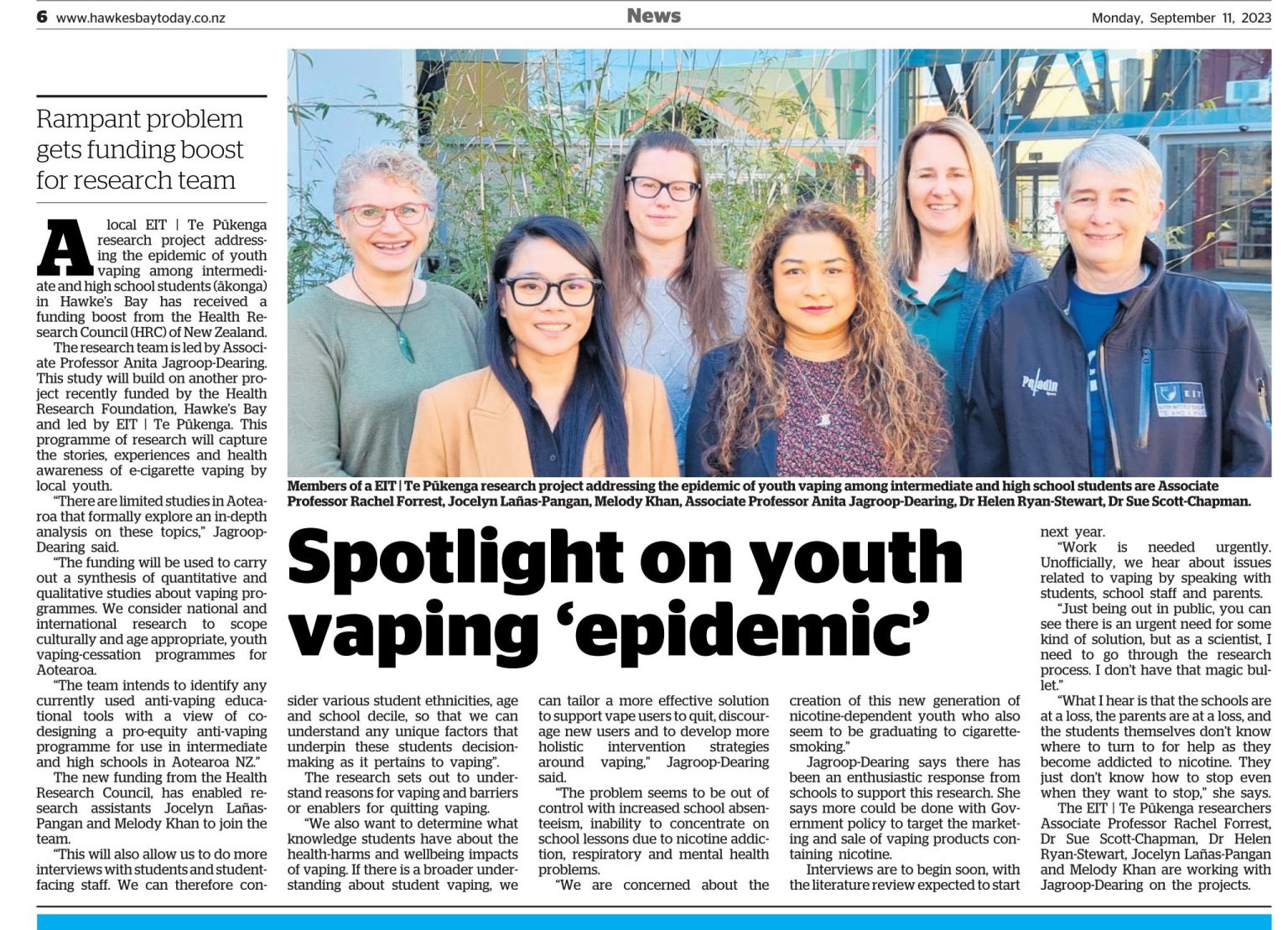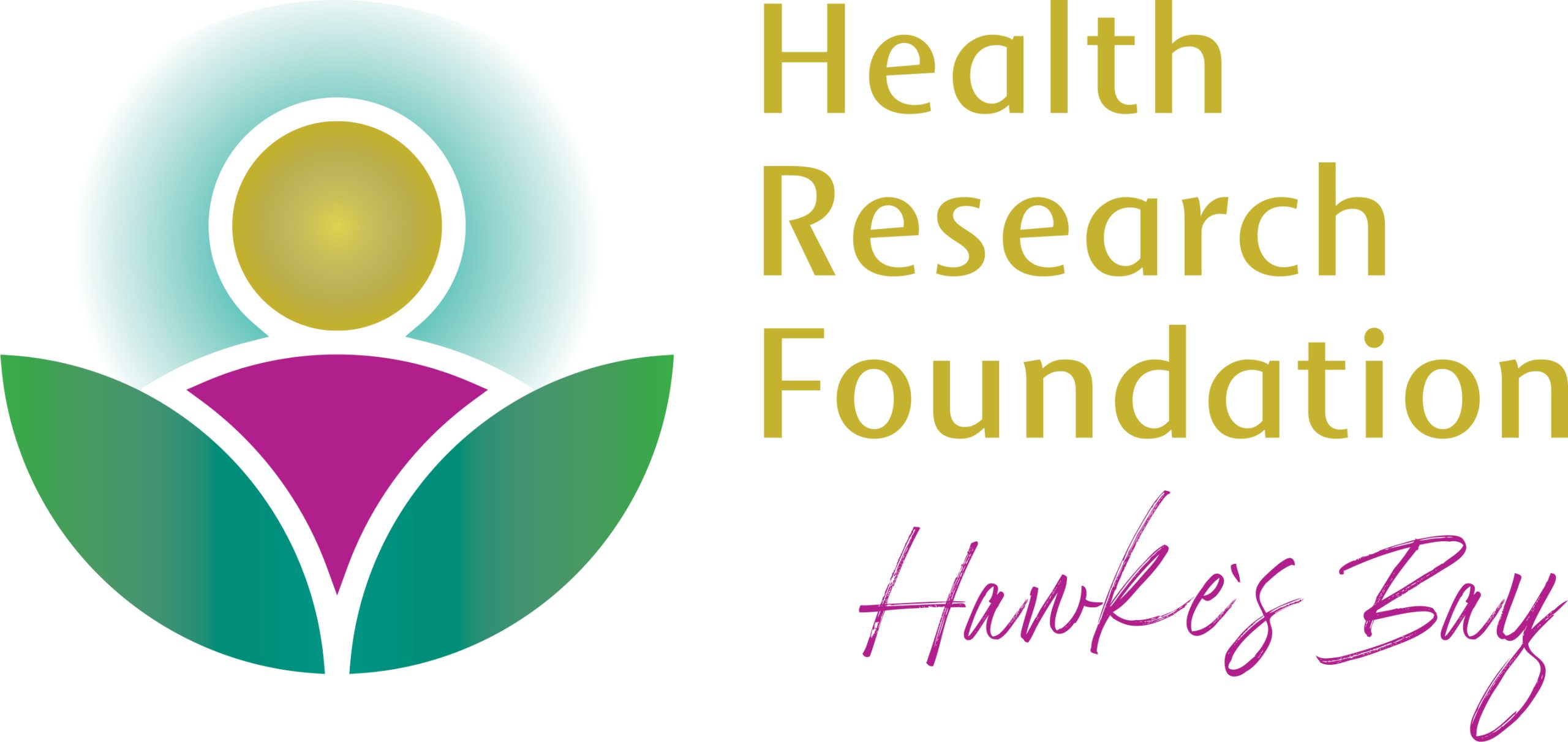
Pushing for change on issue youth vaping
From having joined health collective S.A.V.E. (‘Stop Adolescents Vaping E-Cigarettes’) to now leading a programme of research, Associate Professor Anita Jagroop-Dearing continues to dedicate her science to tackling the issue of youth vaping. Her current research programme*, co-funded by the Health Research Foundation – Hawke’s Bay, focusses on knowledge gaps surrounding the subject. Because, as it turns out, our youth doesn’t actually know much about the harmful impact of vapes.
When Associate Professor Anita Jagroop-Dearing joined S.A.V.E. in 2021, her own background as a researcher was exactly what was needed to propel an ongoing programme of research into the problematic issue of youth vaping in Hawke’s Bay. One of the studies Anita and her team are currently conducting, is to determine where the health knowledge gaps exist amongst youth when it comes to vaping. This knowledge will go towards the development of a toolkit of resources that can be tailored to age, ethnicity and decile.
‘The ‘Stop Adolescents Vaping E-Cigarettes’ (S.A.V.E) is a multi-disciplinary collective of health professionals and community members in Hawke’s Bay who share their concerns around youth vaping and strive for change’, says Dr Jagroop-Dearing. ‘When I joined them we quickly realised that my background as a researcher, combined with my experience in cardiovascular research in the UK, gave us an extra edge in tackling youth vaping, as little research had been done. Unofficial responses from schools already confirmed that they do not know what to do with this issue that is only growing. There are limited resources for intervention or to help curb the problem.’
Surprising early findings
As an adult living a healthy and responsible lifestyle, it is easy to make assumptions around the knowledge of vaping harms amongst our youth – as surely, they know it isn’t good for them? The reality shows that when it comes to education, we’ll most likely have to start from the ground up: ‘The (so far unofficial) data showed a surprising lack of knowledge around the harms of vaping, as well as a lack of knowledge around general health. More could be done to inform parents about the health harms associated with vaping as well; we already see that there are significant gaps. It is our mission to identify exactly where these gaps are and build the toolkit around these knowledge gaps.’
How bad is it?
Though interviews are yet to be carried out, Anita warns of the effects of vaping on our youth: ‘Because of the high nicotine levels available to our youth here in New Zealand, they are becoming addicted faster than some other countries, where nicotine levels are more restricted. They do not realise they are addicted, but experience stress and anxiety. Sadly, they do not make the link with their sense of wellbeing and vaping. Education is being negatively influenced, with increased levels of absenteeism. I anticipate it will develop from absenteeism to complete school dropouts. Before they even start their careers or get a shot at a good future, these kids loose that opportunity. It means that they will not be able to make the most of the opportunities available to them now; opportunities that will set them up for the future.’
Change
Though recent government measures seemed well-intended, Anita sides with the general consensus amongst parents in Hawke’s Bay: it’s not making any significant difference. Changing flavour names and avoiding the opening of additional vape stores within school radius zones isn’t showing any reduction of youth vaping. ‘Youth know what they like, a simplified name doesn’t change that. And there are already countless vaping outlets within the vicinity of many schools in our community, so the behaviour will carry on. In England they now look to ban disposable vapes altogether; we are far behind.’
Complementary research
Anita received funding from EIT to investigate youth vaping and related knowledge gaps. The additional funding by Health Research Foundation – Hawke’s Bay complements this research: it will refine the scope of her research by considering vaping behaviour amongst the various ethnicities. ‘Vaping amongst Māori youth seems to be more prevalent than their European-descend counterparts. This could relate to more parents in these communities smoking, and children therefore adopting similar behaviour. Our research should provide more definitive answers around these concerns.’ By considering the ethnicities, different ages and school deciles, the toolkit will be developed to suit all youth in our community: ‘Eventually, we’d like to have a pilot resource that we can try out here in Hawke’s Bay, and then develop into a nationwide education tool.’
Smokefree 2025
Vaping was introduced as a smoking cessation tool, so it is saddening to see vapes having grown into a nationwide health concern for parents and educators. Anita has previously presented measurement plans to the health committee at parliament, but she feels they should do more to deal with this issue. ‘Introducing vapes has decreased tobacco smoking amongst adults, but it has meant a significant increase in vaping for our youth.
As a nation, we can and should do better.’
Research Lead:
Assoc. Prof. Anita Jagroop-Dearing
Co-investigators:
Assoc. Prof. Rachel Forrest
Dr Helen Ryan Stewart
Dr Sue Scott Chapman
* This research programme is made up of three studies with three sources of funding so far:
1) Research Innovation Centre, Te Pūkenga, EIT
2) Health Research Foundation – Hawke’s Bay
3) Health Research Council, NZ
